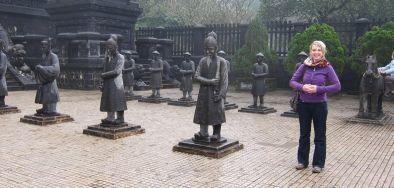Hanoi, 29.1.2011: A Brief Excursion in Asian Philosophy
 Journalists’ exchange – Thoughts on life and death at the huge gravesite of Emperor Minh Mang.
Journalists’ exchange – Thoughts on life and death at the huge gravesite of Emperor Minh Mang.
What differentiates humans from animals? Our guide looked at us and waited intently for our reply, while we looked at him in surprise. Suddenly, my trip to Hué, the old imperial city, had been transformed into a philosophical excursion. It is not what one would necessarily expect from an eight-dollar day trip. Here we stood, though, in the middle of the huge gravesite of Emperor Minh Mang – the perfect place to debate about death, faith and life.
“Most people would say ‘intelligence,’” our guide said to our relief, “but that is not true. Humans always want more than they need. Animals, by contrast, only take what they need to survive. A tiger would never eat more than it is hungry for.” For this reason, the guide explained, in the Buddhist circle of life, the animal comes after humans and before heaven – before the next cycle begins. A Buddhist can only hope to be released from this cycle when he frees himself of necessities and thus reaches nirvana.
I had carefully placed my camera in my pocket; somehow one no longer wants to be just a tourist when one is so suddenly introduced to Asian philosophy. Although the majority of Vietnamese claim they are Buddhists, in real life they do not so strictly adhere to the interpretation of the creeds of the faith, as my colleague Phuong from the Vietnamese newspaper explained to me with a smile: yes, they burn incense, but they do not accept too many restrictions to their lifestyle. Yet, when it’s a matter of death, it is another thing altogether. “There are many rules we must follow when someone dies,” our guide in Hué tells us.
The dead need the aid of their survivors
For the dead seem to have a lot of work to do after their demise and need the support of their survivors. The deceased have to pass through ten portals of hell before they can arrive in heaven. They overcome the first seven during the 49 days after their passing, so the family holds a big celebration for them on the fiftieth day. The next is after 100 days and from then on every year the anniversary of their death is celebrated with a family meal. Every worker is given a day off for this, even if the company is on the brink of collapse.
Community and family are simply more important than all else. This also applies to the dead; in every home and even in every shop there is a small altar with photos and presents. The family also burns paper money at the beginning, middle and end of each month to ensure their ancestors are solvent in the afterlife. “The presents have been adapted to modern times,” says Ly, the manager of my hotel. “We give the deceased televisions, computers and cars because we want them to have a good life,” of course, in miniature versions. The guide in Hué smiles. “Death is more expensive than life in Vietnam.”
published on 29 January 2011 in Westfälische Rundschau.
translated by Faith Gibson Tegethoff








